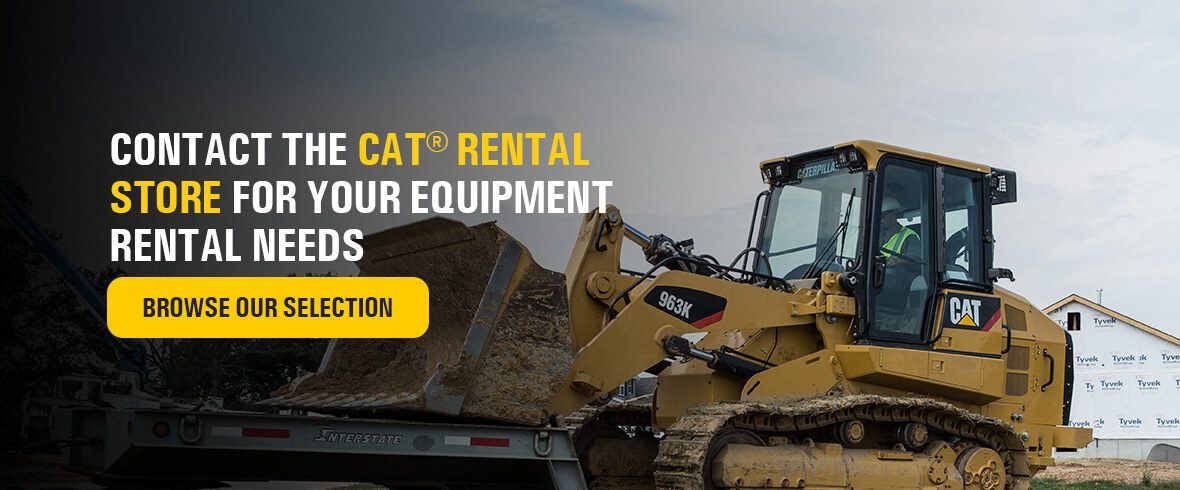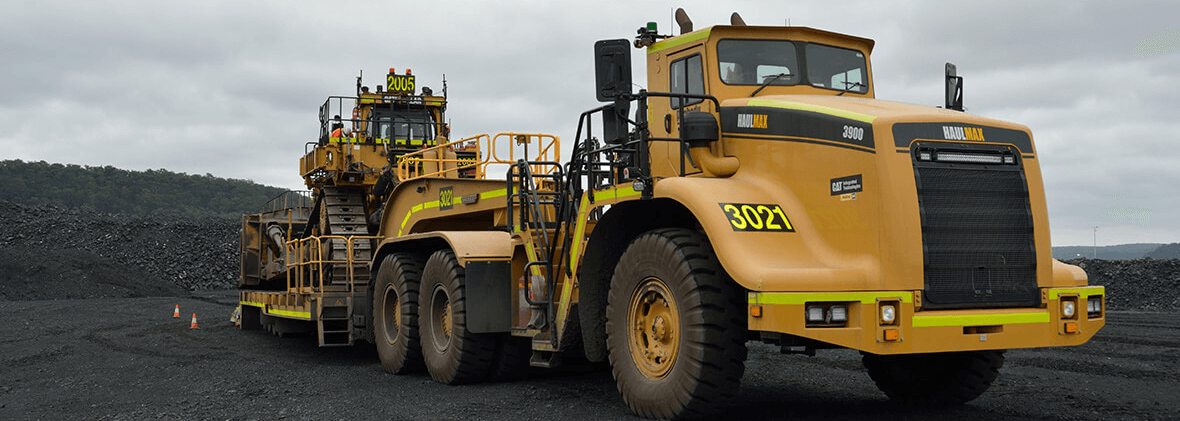
Towing Capacity: Can Your Truck Carry Your Rental?
If you're working at multiple job sites or somewhere farther away, you'll likely need to tow your equipment to complete your project. Towing equipment makes bringing machinery from one job to the next convenient, helping you start your tasks and complete projects sooner.
You may not know if your truck can handle the weight if you've never towed equipment. Below, you'll learn what truck towing capacity means, how to determine what your vehicle can tow and safety tips to help keep yourself and others safe while you're on the road.
Jump to a section:
What Does Towing Capacity Mean?
The towing capacity of a truck refers to the maximum amount of weight the vehicle can pull. Most manufacturers will have the towing capacity published in the manual, but you can also look it up online or calculate it yourself by subtracting the gross combination weight rating and the curb weight, which we'll explain more about below. The towing capacity changes based on the weight of the truck, its configuration, and the distribution and control of the load you tow.
Towing has its own vocabulary, which is essential to understanding towing capacity and whether your truck can carry your rental. Apart from towing capacity, some terms that are helpful to know include:
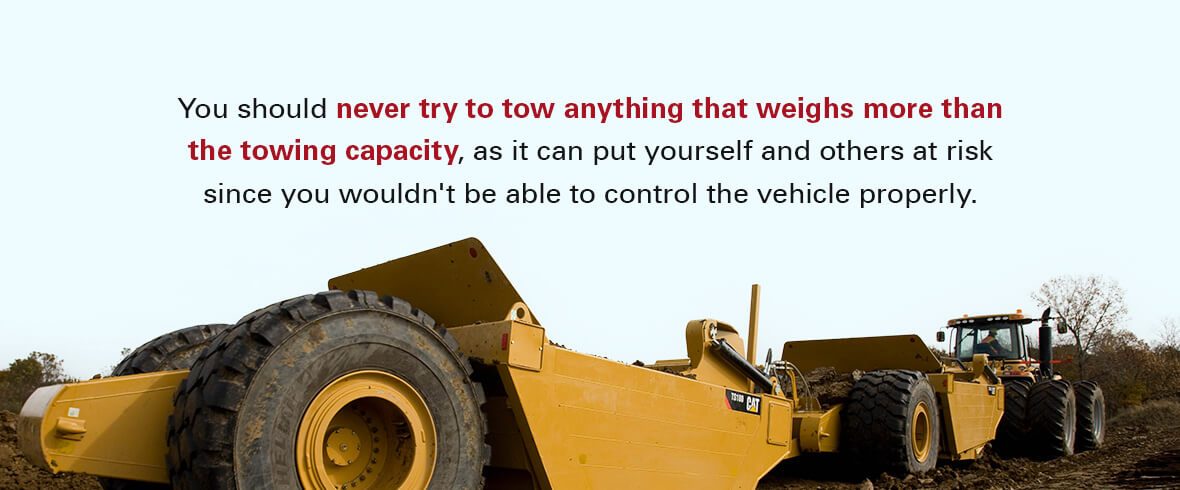
- Curb weight: The curb weight refers to the weight of the truck or trailer when there is no cargo or passengers and all the fluids are full, such as the gas tank. The curb weight for a truck is usually listed in the same place as the tire pressure information, near the driver's door jam. Curb weight for trailers is usually found alongside the manufacturer's specs.
- Dry weight: The dry weight is the weight of a vehicle without any cargo, passengers or fluids the truck needs to function. Generally, the dry weight is the vehicle's weight when it's empty. In most cases, you won't need to know the dry weight to calculate the towing capacity, but it could still be helpful in some calculations.
- Tongue weight: The tongue weight refers to the force that's punishing down the trailer hitch by the truck's load. Tongue weight can vary depending on how the load's weight is distributed in the trailer.
- GTW: Gross trailer weight (GTW) is the total weight of your trailer and its cargo. If you placed your trailer on a scale with all its cargo loaded, the resulting measurement would be the GTW. If your GTW exceeds your towing capacity, you can't tow the trailer safely. You should never try to tow anything that weighs more than the towing capacity, as it can put yourself and others at risk since you wouldn't be able to control the vehicle properly. You could also damage the truck and trailer.
- GCVWR: Gross combined vehicle weight ratings (GCVWRs) refer to the maximum weight of your trailer and towing vehicle combined, including when loaded with cargo. The trailer and the towing truck each have their own weight combined to make up the GCVWR.
- GAWR: The gross axle weight rating (GAWR) is the maximum amount of weight a single axle can handle. The GAWR will usually be different for the front and rear axles. Few vehicles have a perfect weight balance between each axle.
- Payload capacity: The payload capacity refers to the maximum weight a vehicle can carry in its bed and cabin, otherwise known as the weight limit. Payload capacity differs from towing capacity because the latter refers to the weight limit for trailers the vehicle can pull.
Now that you know the towing terms, it's easier to interpret towing capacity to ensure your truck can tow your rental. You can determine precisely how much weight your vehicle can tow so you can choose the right rental equipment or find another way to tow your equipment, including renting a bigger truck with a higher towing capacity.
How to Interpret the Manufacturer's Towing Capacity
Remember that the towing capacity is the maximum weight your vehicle can tow, not how much you can tow in each condition. You can determine the actual towing capacity by using the following factors:
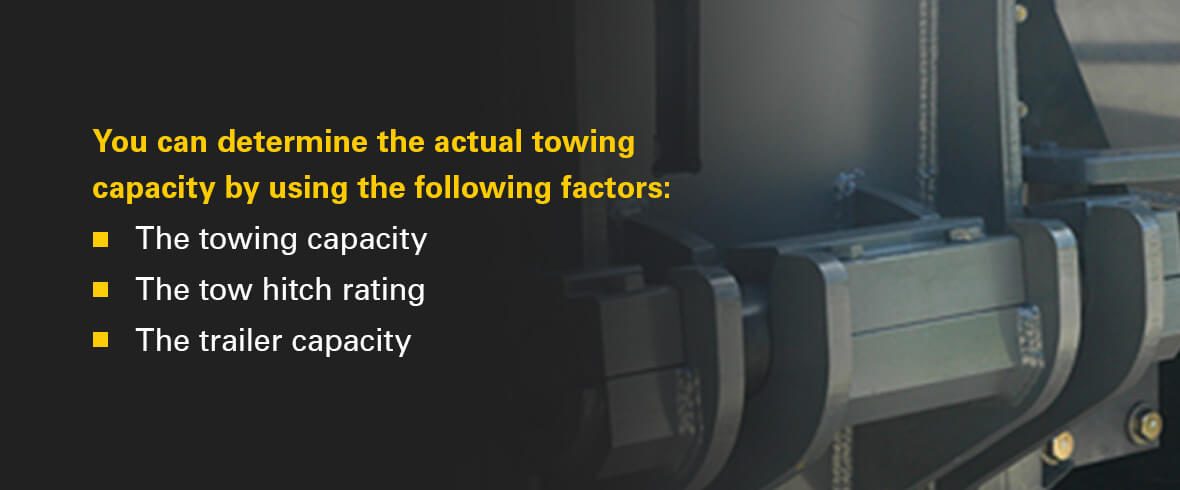
- The towing capacity: Different factors affect how much a truck can tow, including the suspension, transmission and engine. You can also consider upgrading the brakes, radiator and axle to enable your truck to carry more significant loads. However, installing low-resistance or larger tires can lower your total towing capacity. Generally, trucks that are half a ton can tow smaller items, such as utility trailers and small boats. Trucks that are a ton can tow large equipment, such as a backhoe.
- The tow hitch rating: The tow hitch, also called the trailer hitch, connects your truck to what you're towing. Tow hitches are grouped by class and are rated by how much they can pull and their tongue weight. You'll learn more about the different classes of tow hitches to help you determine what class you need to tow your rental equipment.
- The trailer capacity: If you're looking for the most trailer payload capacity, you'll want to look for a trailer with a low curb weight that is designed to withstand heavy loads. You may also want to consider using a trailer with a braking system or independent suspension, which can help reduce trailer sway, improve stop time and improve your handling. Some trailers, such as dump or hydraulic ground-level trailers, can make more complex jobs easier.
The towing capacity will only be as high as the lowest-rated component. For example, if your truck has a towing capacity of 18,000 pounds but your trailer's GCVWR is 15,000 pounds, you'll want to stick with smaller loads that don't exceed 15,000 pounds.
You can calculate your towing capacity for your specific circumstances by using the GCVWR, which includes the entire weight of your vehicles, trailer, cargo, fluids and passengers. You'll also need to know the curb weight, which is the weight of your truck, including all of the fluids it needs to operate. Once you have these two numbers, you'll subtract that GCVWR by the curb weight to get the towing capacity for your specific circumstance. The towing capacity may change based on what you're towing for each job.
It's essential never to exceed the towing capacity, as it can create hazards for the driver and others on the road. Ideally, you won't want to come within 10% of that total to ensure you can safely tow your rental equipment.
Physical Limits of Trailer Hitch Classes
Your tow hitch rating is essential since this device connects your truck to your rental equipment. All tow hitches have their own physical limits, which will determine how much weight your vehicle can tow. There are five trailer hitch classes:
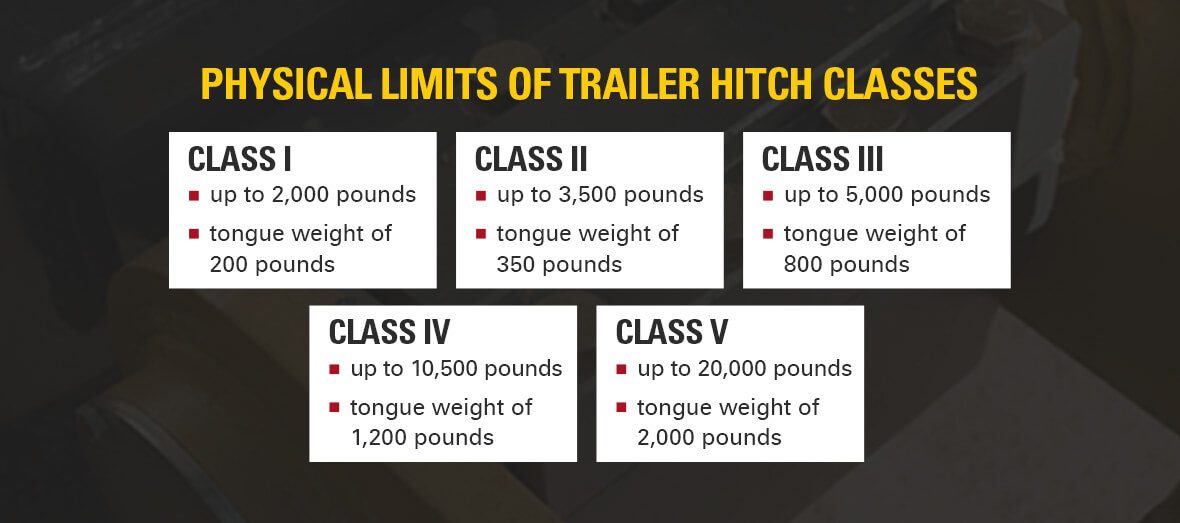
- Class I: This class is the lowest of all the trailer hitch classes, meaning it's typically used for small or mid-size vehicles. These hitches can usually carry up to 2,000 pounds and withstand a tongue weight of 200 pounds. People often use Class I trailer hitches to tow a small cargo trailer, which leaves out most rental equipment.
- Class II: This class of trailer hitch is typically used for minivans or large cars since they're capable of towing up to 3,500 pounds with a tongue weight of 350 pounds. You may use a Class II trailer hitch to tow a small boat or similar-sized equipment, but nothing more significant or heavier.
- Class III: SUVs, trucks and full-sized vans typically use Class III trailer hitches, which are capable of pulling up to 5,000 pounds with a tongue weight of 800 pounds. Class III trailer hitches can pull things as heavy as a mid-size boat or camper.
- Class IV: These trailer hitches can tow weights up to 10,000 pounds and handle a tongue weight of 1,200 pounds. Class IV trailer hitches can handle heavy loads that require weight distribution and can tow large campers, boats or utility trailers carrying lawn equipment. Class IV trailer hitches are suited to towing some types of equipment depending on the overall weight.
- Class V: This class of trailer hitch is the strongest type, capable of carrying up to 20,000 pounds with a tongue weight of 2,000 pounds. Class V trailers are strong enough to tow multi-car or horse trailers, so they're the ideal option when working with heavy rental equipment.
You can determine what type of trailer hitch you need by determining the weight of your rental equipment. You don't want to use a Class II hitch when your rental equipment weighs more than 3,500 pounds because it presents the same problems as towing equipment over the towing capacity. When in doubt, you should choose a trailer hitch class with a higher weight capacity.
Tips to Tow Your Rental Equipment Safely
If you don't use the proper safety measures, towing rental equipment can be dangerous for drivers, passengers and others on the road. Use the following tips to stay safe while hauling your rental equipment to your work site.
1. Stay Within the Limits
One of the most important things you can do to ensure you and others are safe while towing your rental equipment is to stay within the limits of your towing capacity. Review the towing capacity to see that it can handle the weight of your rental equipment. Exceeding the maximum weight can create hazards, including dangerous handling, damage to the suspension or engine, and inadequate braking performance.
On top of ensuring your truck's towing capacity can handle your rental equipment, you'll also want to check that your trailer hitch can withstand the equipment's weight. Your trailer hitch should include a label with the maximum trailer and tongue weight it can handle safely, which you can use to determine if you need a different trailer hitch class. Towing and trailer hitch capacities will vary based on style, size, bed lengths and other equipment installed on the truck, so it's essential to check the manufacturer's information each time you need to tow.
2. Pack Your Trailer Correctly
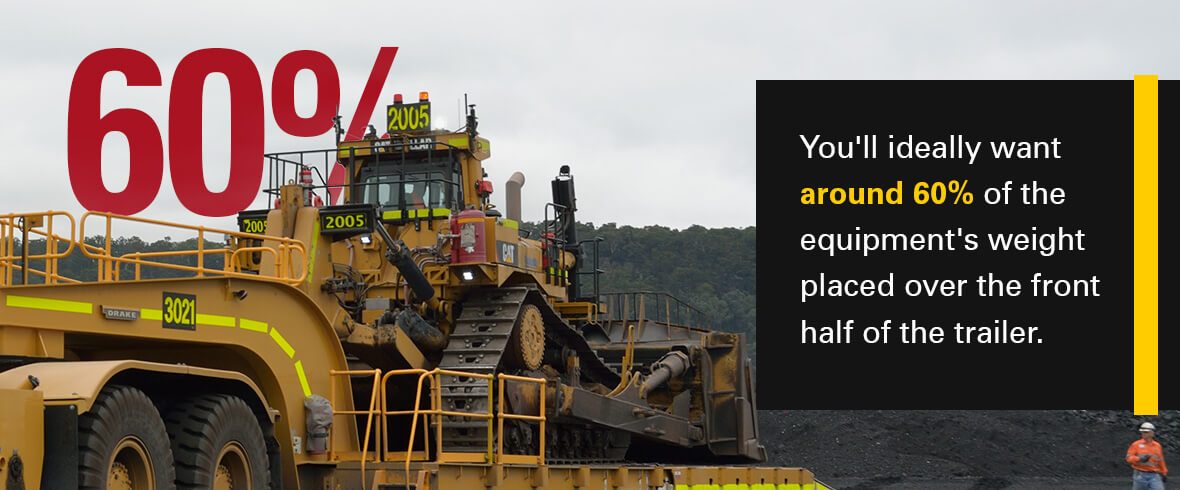
If you're using a rental trailer to tow your rental equipment, you'll want to be sure your trailer is packed correctly so the weight is distributed evenly. You'll ideally want around 60% of the equipment's weight placed over the front half of the trailer. You'll also want to load your equipment so that the tongue weight on the trailer hitch is between 10% to 15% of the total load weight of the trailer.
The weight should be evenly distributed on each side of the trailer. The trailer's owner's manual should include loading and weight distribution techniques to help pack your trailer safely. Once your trailer is loaded correctly, you'll want to secure your equipment to prevent it from shifting during transport.
3. Check Your Tires
The next step to take is to check the tires on your truck and trailer if you're using one. If your tires aren't inflated properly, they can negatively impact your handling.
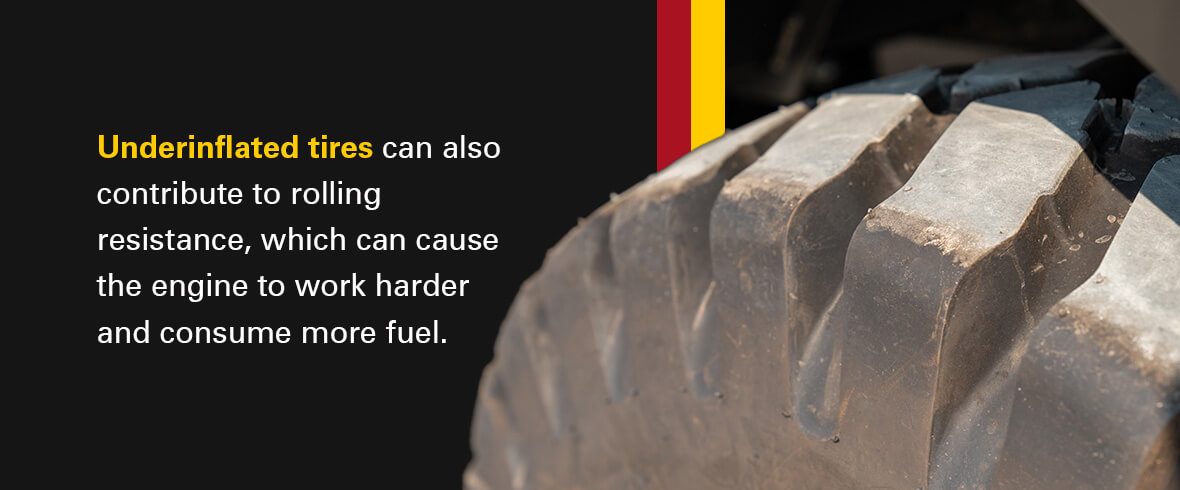
Underinflated tires can also contribute to rolling resistance, which can cause the engine to work harder and consume more fuel. Rolling resistance can also increase your tire's temperature and cause a blowout. Your tires should have the maximum pressure listed on them, or you can find it on the driver's doorjamb, allowing you to fill your tires to the ideal pressure.
You'll also want to check the speed rating on your truck and trailer's tires to be sure you don't exceed the speed while on the road, keeping you, other drivers and your equipment safer. If you're taking your equipment a long distance, you'll want to check the tire pressure in your spare tire just in case you experience a flat. You should also inspect your trailer's hub bearings to ensure they work correctly and are appropriately greased before you tow.
4. Check Your Brakes
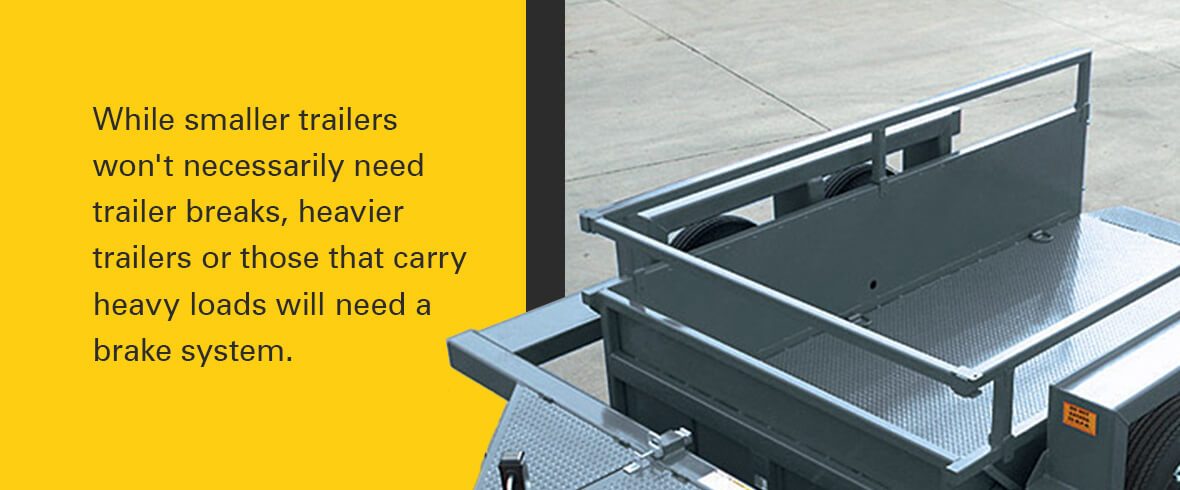
If you're using a trailer to haul your rental equipment, you'll want to determine if you need trailer brakes. While smaller trailers won't necessarily need trailer breaks, heavier trailers or those that carry heavy loads will need a brake system.
On top of checking your trailer's brakes, you should also check the brakes on your tow truck to confirm they're working correctly. You'll have to pay more attention to braking when you're towing your rental equipment since your vehicle will be heavier than usual, so you want to know your brakes can handle the weight of the load.
5. Ensure Your Lights Are Working Correctly
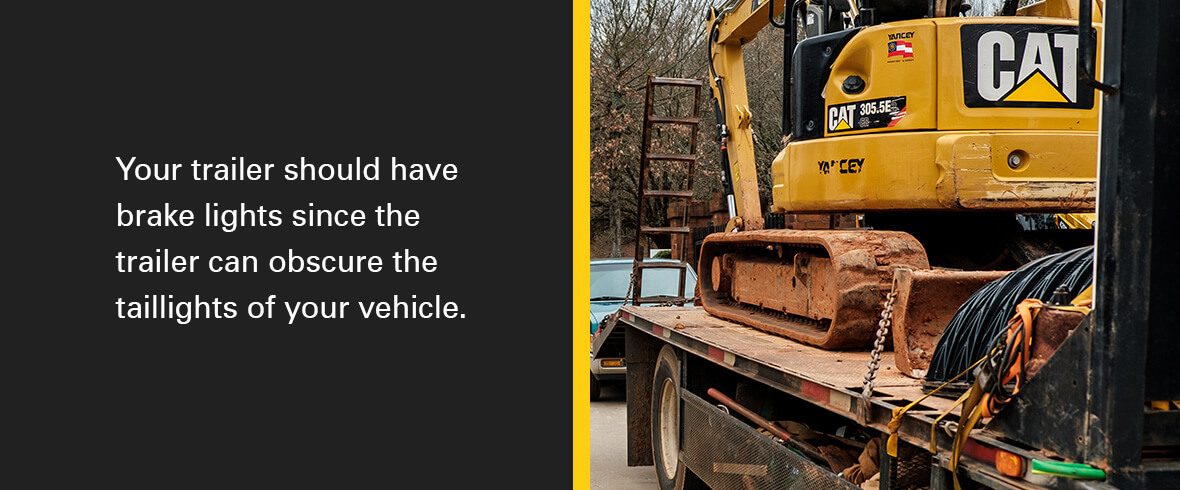
On top of your brakes, you'll also want to check your lights, especially if you're using a trailer. Your trailer should have brake lights since the trailer can obscure the taillights of your vehicle.
If the lights on your trailer aren't working correctly, other drivers may be unable to see your truck or what you're towing, especially if you're driving at night. You can ensure your lights are working by having someone stand behind the truck and trailer while in park to confirm if your brake lights and turn signals are working.
6. Remember Your Truck Will Handle Differently
Take care when driving a truck that's towing your rental equipment. Your total weight will be more than usual, and you won't be able to take turns like you can when you're just driving a truck. The vehicle will also be longer than usual, so you must stay cautious to ensure you don't run into anything while driving. Remember that your truck will handle differently in many ways, including:
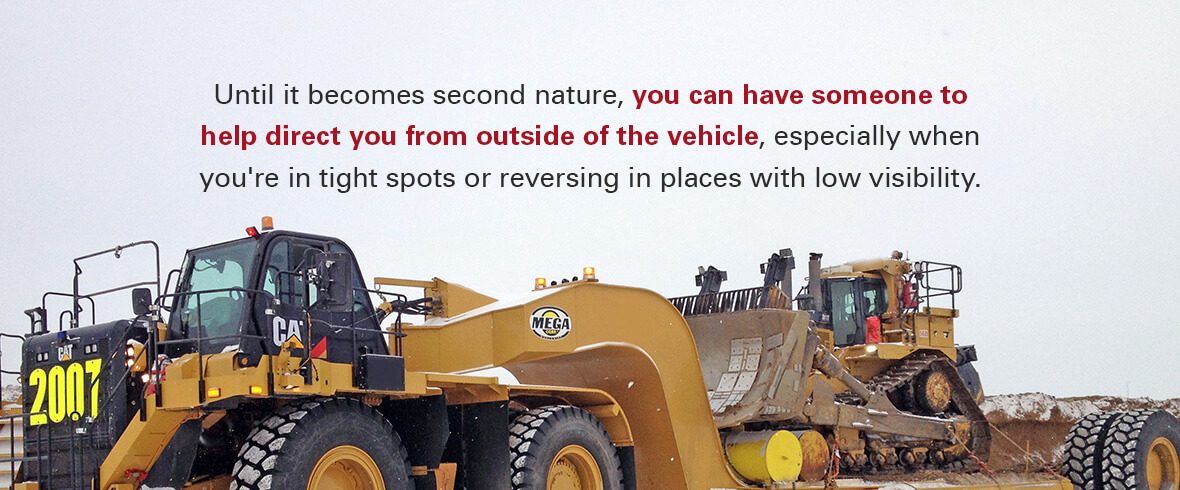
- Turning: Avoid sudden turns since you have more weight and length than usual. Sudden turns can cause the truck or trailer to turn over, resulting in injury or damage to the rental equipment, truck and trailer.
- Reversing: Backing up will be more challenging than driving a regular truck, but you can learn it with practice. Until it becomes second nature, you can have someone to help direct you from outside of the vehicle, especially when you're in tight spots or reversing in places with low visibility.
- Braking: Since your trailer and heavy equipment are making your truck heavier and longer, it will take longer to come to a complete stop than if you didn't have the extra weight. Give yourself plenty of time to stop at traffic lights. You should also be sure to give the drivers in front of you plenty of space so you can come to a stop if they brake suddenly.
You'll also want to remember to adjust your mirrors and have a clear view of your trailer all the way to the end. You may also want to consider investing in mirrors specifically made for towing so you can keep an eye on your equipment and the cars around you on the road.
7. Ensure Maintenance Is Up-To-Date
A truck or trailer that's not correctly maintained may not be capable of towing your rental equipment and could break down unexpectedly while you're on the road. Taking your truck to a qualified technician before you start towing your equipment is the best way to ensure your truck is reliable and can get your rental equipment to your job site without unexpected failures.
You'll also want to check that the maintenance on your rental equipment is current, as you don't want to get to your job site only to find out that your equipment is malfunctioning or needs routine repairs. By working with a reliable rental company, you can ensure your rental equipment is working properly and is well-maintained. These companies will provide you with quality equipment that's properly maintained. Some companies will even perform maintenance on your rental equipment throughout your rental period.
Contact The Cat® Rental Store for Your Equipment Rental Needs
If you're looking for rental equipment for your next project, The Cat® Rental Store dealers are here to help. Our dealers have a wide range of rental equipment, ranging from concrete to power generation equipment. You can browse complete selections to find what you need, or you can talk to one of our team members to help you find the right equipment size to ensure your towing truck can handle the load.
Our dealers offer a wide range of equipment and solutions for your convenience, even if you need them last minute, so you can get started on your project right away. You'll get flexible rental terms so you can find equipment that fits within your budget, and you can even get equipment maintenance during your rental period to ensure it performs as expected on the job. Find a dealer near you to get started on your rental.
Find The Cat Rental Store Near You